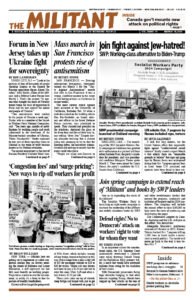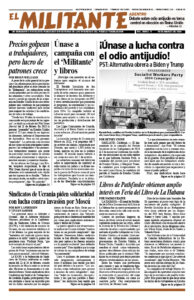The Iranian government claims that 41% of those eligible voted in the March 1 elections to the parliament and the Assembly of Experts, the body that picks the country’s “Supreme Leader.” But even that figure would be the lowest voter turnout since 1990, deepening the long-term trend that reflects growing opposition to the reactionary bourgeois clerical regime.
A posting on an internet site of the teachers union estimated the real turnout was less than 20%.
The independent metalworkers union reports that during the Feb. 26 weekly protest over retirement benefits, thousands of retirees from the telecommunications industry marched in 17 cities. “Not even one of the candidates came to ask, What are your demands?” the union pointed out. “We’ve heard enough lies. We won’t vote anymore!” was one slogan at labor protests around the country.
Leaders of the independent teachers union, the metalworkers union and other unions called on workers to not vote.
Growing numbers of working people reject Tehran’s trampling on democratic rights; its jailing of trade unionists, student activists and defenders of women’s rights; the increase in executions; and the regime’s relentless efforts to expand its counterrevolutionary reach abroad, including its backing of anti-working-class terrorist groups like Hamas.
In the wake of mass protests in 2022-23 after the death of Zhina Amini following her arrest by the “morality” police for allegedly violating the strict dress code for women, there has been an increase in protests. They have targeted the government’s brutality, especially against oppressed nationalities like the Kurds and Baluch. There have been more strikes, labor protests, rallies by retirees and other resistance to government policies and to boss actions that lay the brunt of the effects of U.S. sanctions and the capitalist economic crisis on working people.
Most of the so-called reformist parties, the loyal opposition to the regime, urged people not to vote. Former President Mohammad Khatami made it widely known he didn’t vote.
To prevent even the mildest of opposition from having a voice, the Guardian Council ruled 30% of parliamentary candidates off the ballot, mostly “reformers,” including 22 who are currently members of parliament. Former Iranian President Hassan Rouhani was disqualified from running for reelection to the Assembly of Experts.
Supreme Leader Ayatollah Ali Khamanei had said that not voting would strengthen Iran’s enemies. His exhortations fell on deaf ears.
The regime also tried to call on solidarity with Hamas’ attacks on “Zionists” in Israel to boost the vote, without effect.
Many who did vote opposed the regime by spoiling their ballots. In one district in Yazd province invalid ballots came in second.
“We succeeded. All of us, truckers and drivers, took saying ‘no’ to the elections as the first step to win our protest,” said the association of truck drivers. It includes independent owner-operators and employees of trucking companies demanding better rates and conditions.

